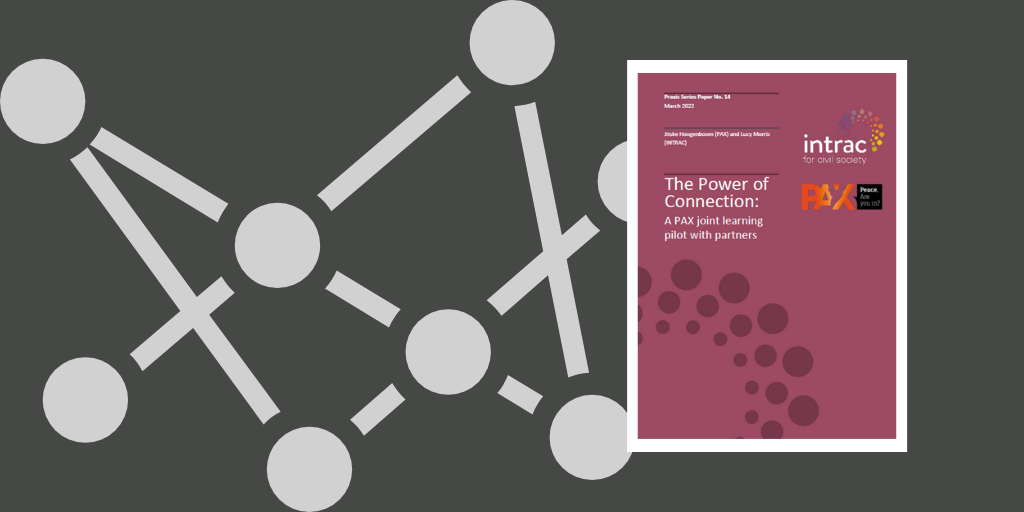
Praxis Series Paper No. 14: “The Power of Connection: A PAX joint learning pilot with partners” is now available to download.
What does it take for INGO staff and partner staff to learn together as equals? And how can you deliberately design for complexity and dynamic environments?
In the latest entry in INTRAC’s long-running Praxis Series of papers, authors Lucy Morris and Jitske Hoogenboom explore shifting power through shared learning. The paper describes an innovative joint learning pilot programme for staff and partners of PAX, the Dutch peacebuilding NGO. This programme was undertaken at the height of the COVID-19 pandemic in some of the world’s most challenging civil society contexts including Syria, South Sudan, and Palestine.
Praxis Series Paper No. 14, titled “The Power of Connection: A PAX joint learning pilot with partners” contains insights which the authors hope will be helpful to international NGOs and foundations. The paper will be of particular interest to those aspiring to increase their investment in mutual capacity sharing, as opposed to one-off or one-way training courses for partners.
Key findings
The paper offers five principal insights:
- There is value in intentional shared learning programmes. Shared learning between INGOs and partners may be hard due to differences in roles and power, but is worth striving for. Shared learning helps shifts the power and turns mutual capacity strengthening jargon into reality.
- Reflective peer-to-peer learning amongst partners worked well. But the extent of learning depends on how much time people put in, and the level of external facilitation. Peer learning requires time and investment, and is different to ‘shared learning’. Ambitions need to match commitment.
- Ownership should be relentlessly cultivated throughout the learning programme. Ownership is not once-and-for-all, but a continuous process with key stakeholder groups. You have to be as clear as possible about what success looks like for different stakeholders.
- Experiment with lots of learning methods, but adapt quickly to what is working for your particular group of participants. It is about creating varied opportunities for participants to engage, and regular reviews in order to adapt your approach.
- Learning should be linked to practical action. Where possible, support participant commitments to put learning into practice with the funding to make that feasible in real time.
The paper finds that shared learning can be very powerful. As one participant in the pilot programme put it:
“ [The programme] motivated me and made me dream about what could happen tomorrow, the change we could achieve here, even if it is only the next generation that will achieve it. This program encourages you to step out of your comfort zone and try new things. It changed me, increased my confidence, made me dream and speak more boldly with others about non-violent action. Before, I never imagined that I could mobilize people, influence them, have them create a movement, but now I see it is possible.”
The new paper is freely available to download now, along with the rest of the Praxis Series.
“It is very easy to talk about ‘mutual capacity strengthening’, and most INGOs and foundations would agree that learning should be a two-way process with partners. But it is so much easier said than done. However, we are convinced that it is definitely worth the effort, and one important element in shifting and sharing our power.”
Lucy Morris and Jitske Hoogenboom
The authors have each contributed to the Praxis Series before. Lucy Morris is Principal Consultant for Organisational Develoment at INTRAC who previously co-wrote Praxis Series Paper No. 13, “Is there lasting change, five years after EveryChild’s exit?” (2021) Jitske Hoogenboom is Policy Advisor Learning at PAX where she focuses on stimulating learning within and between peace programmes. She co-wrote Praxis Series Paper No. 10, “Innovations in Action Learning” (2020).